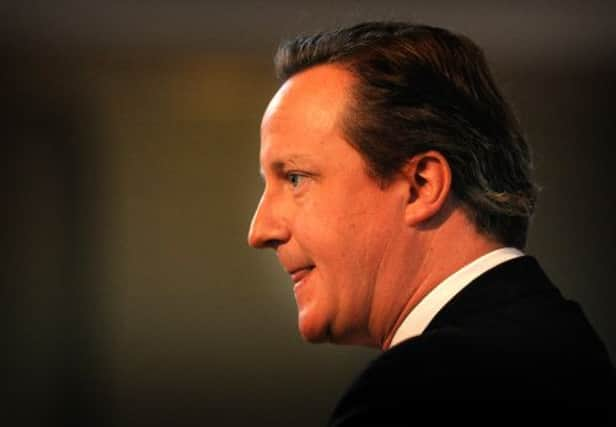Scottish independence: David Cameron ‘stay’ appeal


The Prime Minister made his pitch at a Scottish Conservative fringe meeting at the Tory conference in Manchester and mocked First Minister Alex Salmond for his demands for a television debate.
To a cheering audience he emphasised that his party was at a crucial moment in its history as a party of the Union.
Advertisement
Hide AdAdvertisement
Hide AdHe said: “This is such an important time for our party. It is important because of the debate about the general election, but it is [also] vital because of the debate over the future of the United Kingdom.”
He said the independence debate now had to be won in people’s hearts and called on Tories to go back to constituencies in England and campaign to save the United Kingdom.
He said: “I want the message to go out from this conference here in Manchester, here in England, here amongst the Conservatives to the people in Scotland to be simply this: ‘We want you to stay. We value Scotland being part of the UK.’
“I want the rest of the UK to shout loudly that we will be better off with you with us.
“I think all the evidence stacks up so strong for keeping our United Kingdom together. I am in absolutely no doubt that Scotland together with the UK will be better off, be stronger, safer, will be more prosperous.”
But after this week receiving a second letter from Mr Salmond demanding a television debate on the future of Scotland, he publicly mocked the SNP leader.
He made it clear such a debate would only happen with the former Labour chancellor and head of the Better Together campaign Alistair Darling.
He joked: “I seem to have got a new pen pal. I receive letters almost on a daily basis. It’s a bit like listening to my children – ‘can we have some time on the telly?’.
Advertisement
Hide AdAdvertisement
Hide Ad“Well I have got a message for Alex Salmond which is I know you want to change the subject, I know you want to find some way of deflecting from the issues, but the question on the future of Scotland is for the people of Scotland to determine.
“So it is right when we come to this TV debate that the leader of the Yes campaign debates the leader of the No campaign.
“Alex Salmond wants a debate between the SNP and the Tories. He wants a debate between Scotland and the UK. He wants a debate between Scotland and England. We will tell him no, this is a debate between people who live in Scotland and it is about their choice about whether to stay in the UK or whether to leave the UK.”
Earlier, Mr Cameron spoke of a “well spring of affection” for Scotland from the rest of the UK and said he wished the referendum could happen next week.
Commenting on Mr Cameron’s refusal to hold a televised debate with Mr Salmond, SNP MSP Annabelle Ewing said: “David Cameron says he will do everything he can to stop Scottish independence, but is not prepared to actually debate the issue – even though his Tory government is driving and directing the No campaign.
“Mr Cameron should either put up or shut up, but if he thinks it is wrong for him to be debating Scotland’s future, how much more wrong is it that someone so utterly unrepresentative of Scotland should be our Prime Minister in the first place?”
The debate over Scotland’s future also saw a prominent English Tory MP Jacob Rees Mogg appeal to the English to stop worrying about the West Lothian Question (in which Scottish MPs can vote on UK issues, but the rest of the UK’s MPs cannot vote on certain Scottish ones) to help keep the UK together.
Speaking at a fringe meeting, the North East Somerset MP, who once stood as a candidate in Fife, said: “Education and health policy in England will be made by people who cannot vote on those self same subjects for their own districts. This is absurd and very unfair on the English.”
But he added: “Those of us who are English should feel that this is a price worth paying for the United Kingdom.”